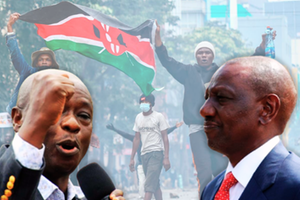Jumwa’s initiative gives impetus to gender quest

Public Service, Gender and Affirmative Action CS Aisha Jumwa. She has inaugurated a multi-agency working group on gender rule made up of state and non-state actors.
What you need to know:
- Public Service and Gender Cabinet Secretary Aisha Jumwa, has inaugurated a multi-agency working group on gender rule made up of state and non-state actors.
- It is aimed at overseeing an inclusive process and taking the lessons learnt from the previous attempts.
The government has embarked on a new campaign that will culminate in the implementation of the elusive two-thirds gender rule.
The new push is being led by Public Service and Gender Cabinet Secretary Aisha Jumwa, who has inaugurated a multi-agency working group on gender rule made up of state and non-state actors. It is aimed at overseeing an inclusive process and taking the lessons learnt from the previous attempts.
The CS is expected to gazette a taskforce comprising stakeholders to build consensus on a roadmap for implementing the gender rule.
A high-level meeting held in Nairobi marked the first step towards drafting of a bill setting the requisite gender balance in parliament.
Speaking during the event, Ms Jumwa said she is optimistic that the dream of achieving gender rule will be achieved.
“There have been several attempts to implement the two-thirds gender rule from the MPs and the executive, all of which have failed. We have now embarked on a new journey that has the support of the highest office in the land,” said Jumwa.
The CS added she is confident that the opposition led by its leader Raila Odinga will support this new push.
“We are very confident that if we work together, we will succeed and have the gender rule implemented,” said the CS.
The CS holds that this is the beginning of the process to build consensus on compliance to the not more than two third gender principle legislative instruments.
Optimism
Daisy Amdany, the Executive Director at the Community Advocacy and Awareness Trust, said she is optimistic that the new push will bear fruit. She noted the stakeholders who have been brought on board have been instrumental in the push for the implementation of gender rule.
“We want to appreciate the demonstration of the political will in the new push to have the gender rule implemented. We have been on this journey for the last 13 years,” she said.
Kenya Kwanza, in its manifesto, committed to implementing the gender rule within one and a half years upon forming government.
Nominated Senator Beth Syengo has also moved a proposal on the gender principle, which is due for debate later in August.
The gender rule dilemma has stalked Parliament, with all their four attempts to operationalise the constitutional requirement failing to find a solution. Representation of women in Parliament remains minimal at only 22 per cent.
Only 9.8 and 20.7 per cent of the 10th and 11th parliament respectively constituted women, making it the lowest in East Africa. Besides the political arena, the underrepresentation of women in positions of power in the Cabinet, senior government positions and state corporations have been a concern.
According to the Ministry of Public Service and Gender, most women occupy low areas of economic performance, while men occupy high areas of production, a situation largely blamed on patriarchy.
It is for this reason that the ministry came up with the Women Economic Empowerment Strategy 2020-25 to sensitise women and build their capacity for socioeconomic empowerment. The strategy captures challenges and solutions.
Maraga advisory
Retired Chief Justice David Maraga in 2020 sparked a storm when he advised President Uhuru Kenyatta to dissolve the 12th parliament over failure to implement the gender rule.
Justice Maraga advised then President Uhuru Kenyatta, to dissolve parliament in accordance with Article 261(7), a move that seemed to have divided the country right in the middle. He termed it the radical remedy Kenya desired to make the political elite adhere to and fully operationalise the transformation agenda of the Constitution.
“In the circumstances, let us endure pain, if we must, if only to remind ourselves, as a country, that choices, and particularly choices on constitutional obligations, have consequences. Let us endure pain if only to remind the electorate to hold their parliamentary representative accountable.
"Let us endure pain if only to remind ourselves that, as a country, being a democracy that has chosen to be governed by the rule of law, we must say no to impunity and hold everyone accountable for their actions and omissions,” the advisory read.
Justice Maraga noted that besides the Supreme Court Advisory Opinion issued on December 11, 2012, and the High Court order issued on June 26, 2016, in Constitutional Petition No 182 of 2015 on March 29, 2017, Justice Mativo directed Parliament and the Attorney-General to take steps to ensure the required legislation is enacted with 60 days from that date and a report made to the Chief Justice.
“As such, for over nine years now, Parliament has not enacted the legislation required to implement the two thirds gender rule, which the Court of Appeal observed in its said judgment, is clear testimony of Parliament’s lackadaisical attitude and conduct in this matter. Consequently, it is my constitutional duty to advise you to dissolve Parliament under Article 261(7) of the Constitution,” Maraga said.
The move came after the Law Society of Kenya started a process that sought to compel the President to dissolve Parliament for failing to initiate implementation of constitutional provisions that would ensure gender balance in both levels of government.



